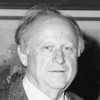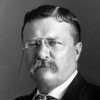“ A political leader who fights openly for principles, and who keeps his position of leadership by stirring the consciences and convincing the intellects of his followers, so that they have confidence in him and will follow him because they can achieve greater results under him than under any one else, is doing work which is indispensable in a democracy. ”
Theodore Roosevelt, Theodore Roosevelt; an Autobiography (1913). copy citation
| Author | Theodore Roosevelt |
|---|---|
| Source | Theodore Roosevelt; an Autobiography |
| Topic | leadership democracy |
| Date | 1913 |
| Language | English |
| Reference | |
| Note | |
| Weblink | http://www.gutenberg.org/files/3335/3335-h/3335-h.htm |
Context
“An organization is necessary; but the men in opposition always call it a machine. Nevertheless, there is a real and deep distinction between the leader and the boss, between organizations and machines. A political leader who fights openly for principles, and who keeps his position of leadership by stirring the consciences and convincing the intellects of his followers, so that they have confidence in him and will follow him because they can achieve greater results under him than under any one else, is doing work which is indispensable in a democracy. The boss, on the other hand, is a man who does not gain his power by open means, but by secret means, and usually by corrupt means. Some of the worst and most powerful bosses in our political history either held no public office or else some unimportant public office.”
source


